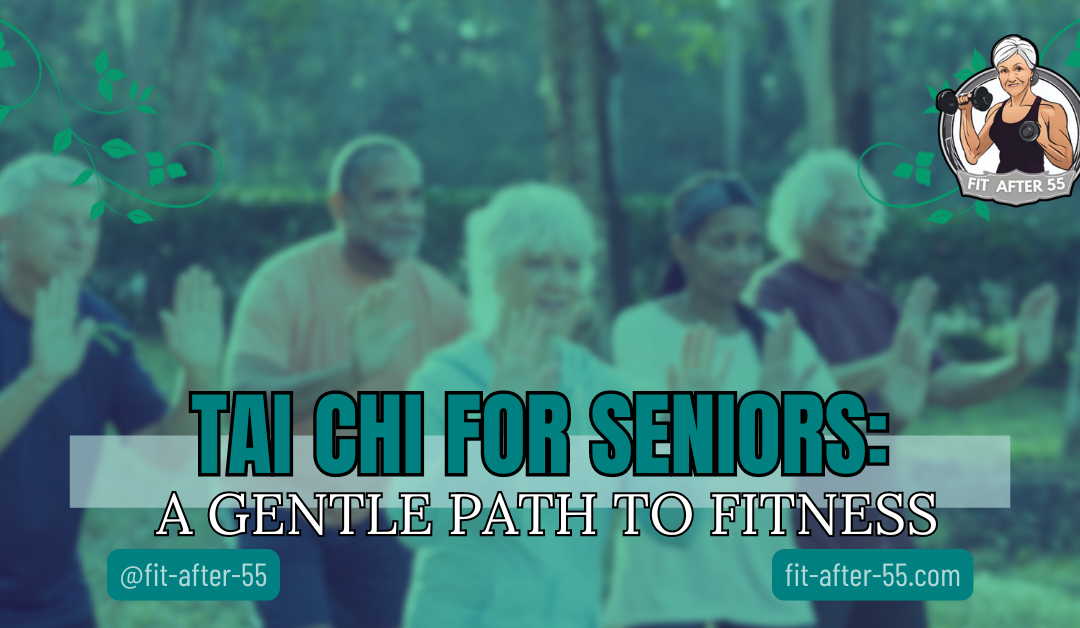Tai Chi for seniors offers a gentle, flowing fitness approach that promotes physical and mental well-being. Unlike high-impact exercises, Tai Chi focuses on slow, deliberate movements that improve balance, flexibility, and strength without straining the joints. This ancient practice isn’t just about movement; it encourages relaxation, reduces stress, and enhances mindfulness, making it perfect for seniors looking to stay active in a calm and supportive way. Discover how this time-tested discipline can be an accessible and fulfilling path to maintaining overall health in your golden years.
Enhancing Balance and Well-Being Through Tai Chi: A Path to Graceful Aging
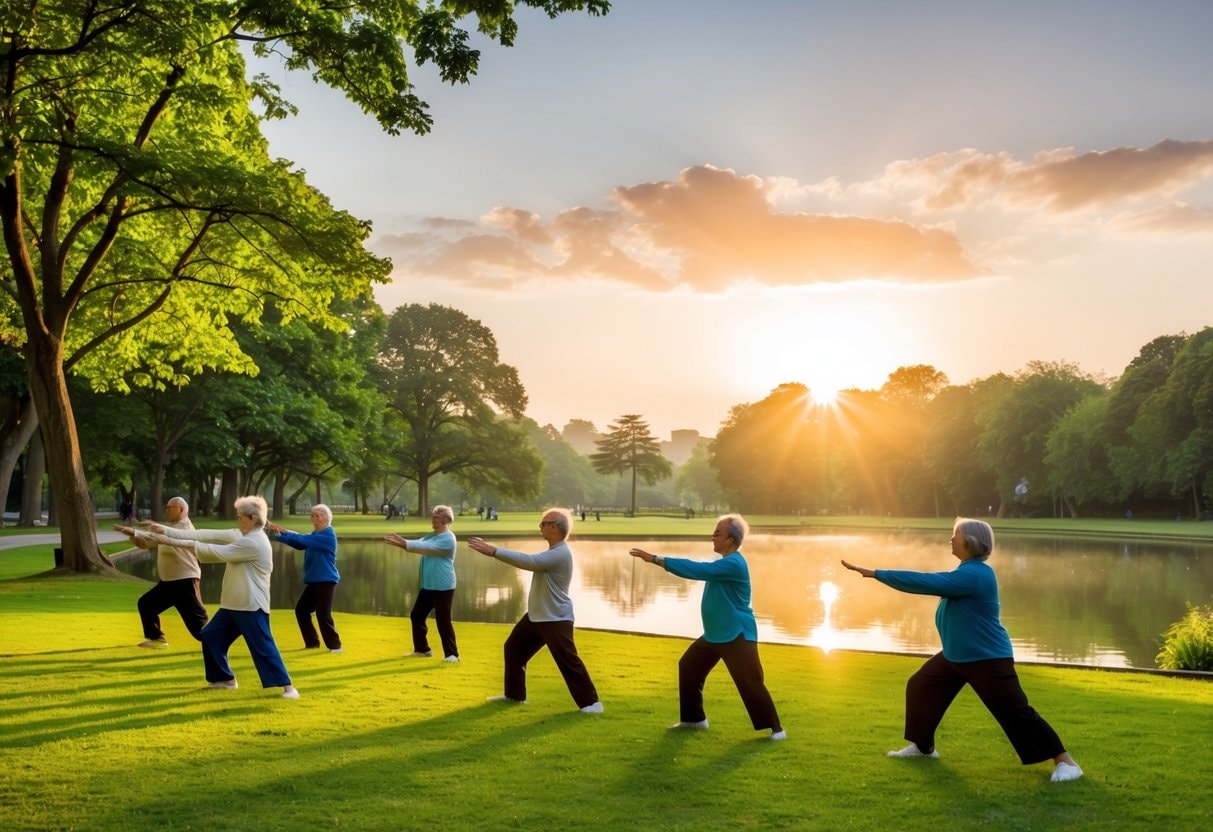
Tai Chi offers seniors a unique way to stay active and healthy. This ancient Chinese practice combines slow, flowing movements with deep breathing and meditation. Tai Chi for seniors is an ideal exercise that improves balance, flexibility, and strength while being gentle on the joints. You might wonder if Tai Chi is right for you. Unlike high-impact workouts, Tai Chi’s gentle movements make it perfect for older adults of all fitness levels.
Tai Chi can be done standing or sitting, making it easy to adapt to your needs. It’s not just good for your body—it’s great for your mind, too. Regular practice can help reduce stress, improve focus, and boost mood. It’s a chance to connect with others and find inner peace through mindful movement.
Key Takeaways
- Tai Chi is a safe, low-impact exercise that improves balance and strength for seniors.
- You can adapt Tai Chi to fit your fitness level and physical abilities.
- Regular Tai Chi practice benefits both physical health and mental well-being.
Understanding Tai Chi: Origins and Principles
Tai Chi for Seniors blends ancient Chinese wisdom with gentle movements. It offers a unique approach to health and wellness that seniors can easily fit into their daily lives.
The Philosophy Behind Tai Chi
Tai Chi has roots in Taoism and Chinese martial arts. It’s based on the idea of balance between yin and yang. You’ll find that Tai Chi focuses on the flow of chi, or life energy, through your body. The practice aims to bring harmony to your mind and body.
As you do Tai Chi, you’ll learn to be more mindful. This can help you feel calmer and more centered. Tai Chi teaches you to move with purpose. Each motion has meaning and connects to your breath. This mindful approach can help you in other parts of your life.
Key Components of Tai Chi Practice
When you start Tai Chi, you’ll learn some basic moves. These include:
- Slow, flowing movements.
- Deep breathing.
- Meditation.
- Body awareness.
Tai Chi emphasizes moving as one unit. You’ll practice shifting your weight smoothly from one leg to the other, which helps improve your balance and strength. You’ll also focus on your posture, which helps your chi flow freely.
As you practice, you’ll become more aware of how you hold your body. Tai Chi isn’t just physical; it’s also a form of moving meditation. You’ll learn to quiet your mind and focus on the present moment, which can help reduce stress and boost your mood.
Did you Know?
Tai Chi offers many benefits for seniors. It can improve balance, reduce stress, and adapt to different fitness levels.
Physical and Mental Benefits for Seniors
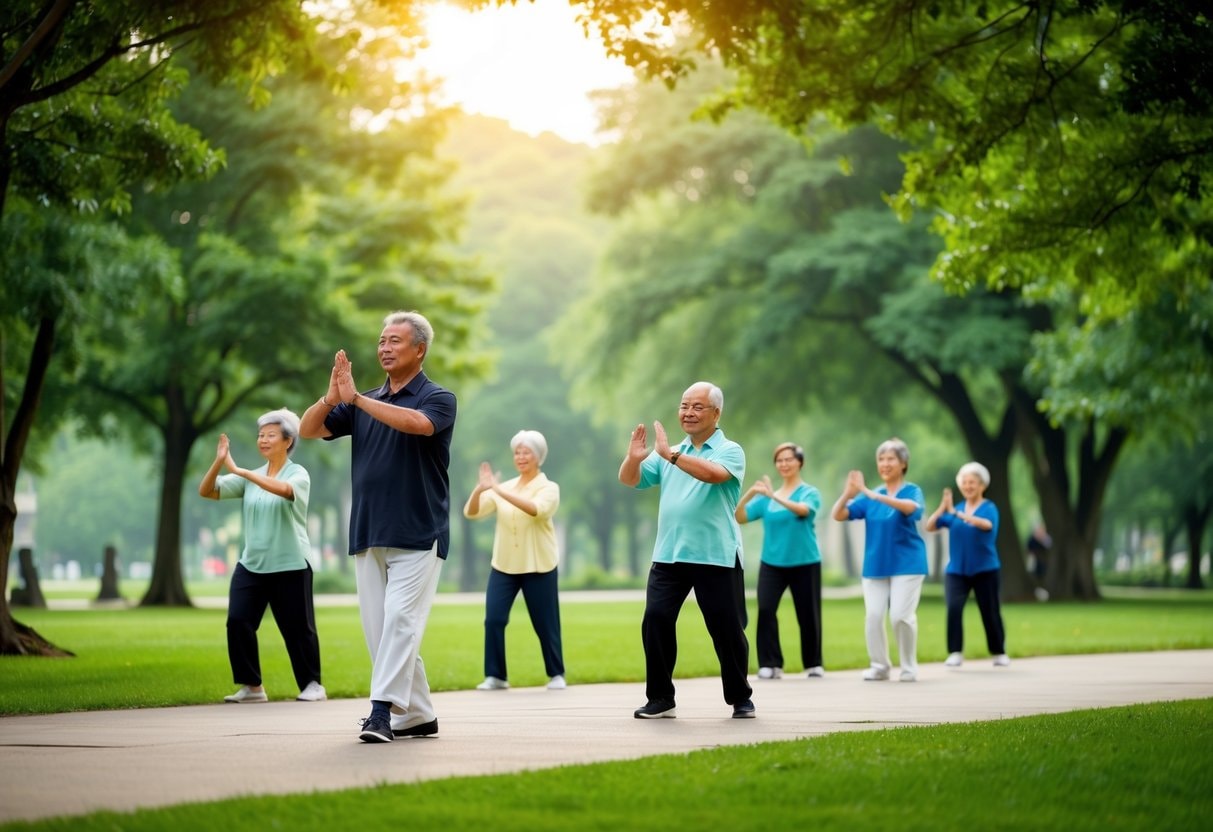
Tai Chi for Seniors offers many perks for older adults. It helps your body and mind in several ways. Let’s examine how Tai Chi for Seniors can improve your health and life.
Improving Physical Well-being
Tai Chi can boost your physical health in many ways. It makes your muscles stronger and more flexible, which helps you move better and reduces aches and pains. You’ll also find your balance improves, which is great for preventing falls, a big worry for many seniors.
Tai Chi’s slow, steady moves work your legs and core, making you more stable on your feet. Your heart health can improve as well. The gentle exercise gets your blood flowing without being too hard on your body. This can help lower your blood pressure and make your heart stronger.
Enhancing Mental Health
Tai Chi isn’t just good for your body and helps your mind. The calm, focused movements can ease stress and make you feel more relaxed. Many seniors find Tai Chi helps them sleep better at night. Getting enough rest is key for your mental health and mood.
The practice can also sharpen your mind. It may help slow down memory loss and keep your brain active. You must remember the moves, which gives your mind a good workout. Tai Chi classes are often social events. Meeting new people and making friends can boost your mood and fight loneliness.
Tai Chi for Preventive Care
Tai Chi can help keep you healthy as you age. It’s a great way to prevent health issues before they start. Tai Chi can help fight osteoporosis in your bones. The gentle movements put enough stress on your bones to keep them strong.
If you have arthritis, Tai Chi might ease your joint pain. The slow, smooth moves can improve your range of motion without hurting your joints. Tai Chi may even boost your immune system. This means you might get sick less often and recover faster when you do catch a bug.
Tai Chi Exercises and Techniques
Tai Chi offers a variety of gentle movements and breathing techniques that can improve your balance, flexibility, and overall well-being. These exercises are easy to learn and can be adapted to suit your needs and abilities.
Basic Movements for Beginners
Start with simple Tai Chi exercises focusing on gentle movements and proper alignment. Try the “circling hands” exercise:
- Stand with your feet shoulder-width apart.
- Raise your hands to chest level.
- Move your hands in slow, circular motions.
- Keep your movements smooth and controlled.
Another beginner-friendly move is “drawing the bow.” This exercise helps open your chest and lungs while building strength in your arms and legs. Remember to maintain good posture and keep your movements slow and deliberate. As you practice, you’ll develop better core stability and balance.
Breathing and Relaxation Techniques
Tai Chi for seniors emphasizes deep breathing and relaxation. Try this simple technique:
- Stand comfortably with your feet hip-width apart.
- Take a slow, deep breath through your nose.
- Exhale slowly through your mouth.
- Focus on your breath and let the tension melt away.
Combine this breathing exercise with gentle stretching to enhance relaxation. As you breathe, imagine stress leaving your body with each exhale.
Developing a Daily Routine
Create a Tai Chi routine that fits your schedule and abilities. Start with a short warm-up:
- Gentle neck rolls.
- Shoulder shrugs.
- Arm circles.
- Ankle rotations.
Then, practice your basic Tai Chi movements for 10-15 minutes. Gradually increase your practice time as you become more comfortable. Try to practice at the same time each day to establish a habit. You can do Tai Chi indoors or outdoors, whichever you prefer. Remember, consistency is key to reaping the full benefits of Tai Chi.
Tai Chi For Seniors: Adapting Tai Chi for Different Needs
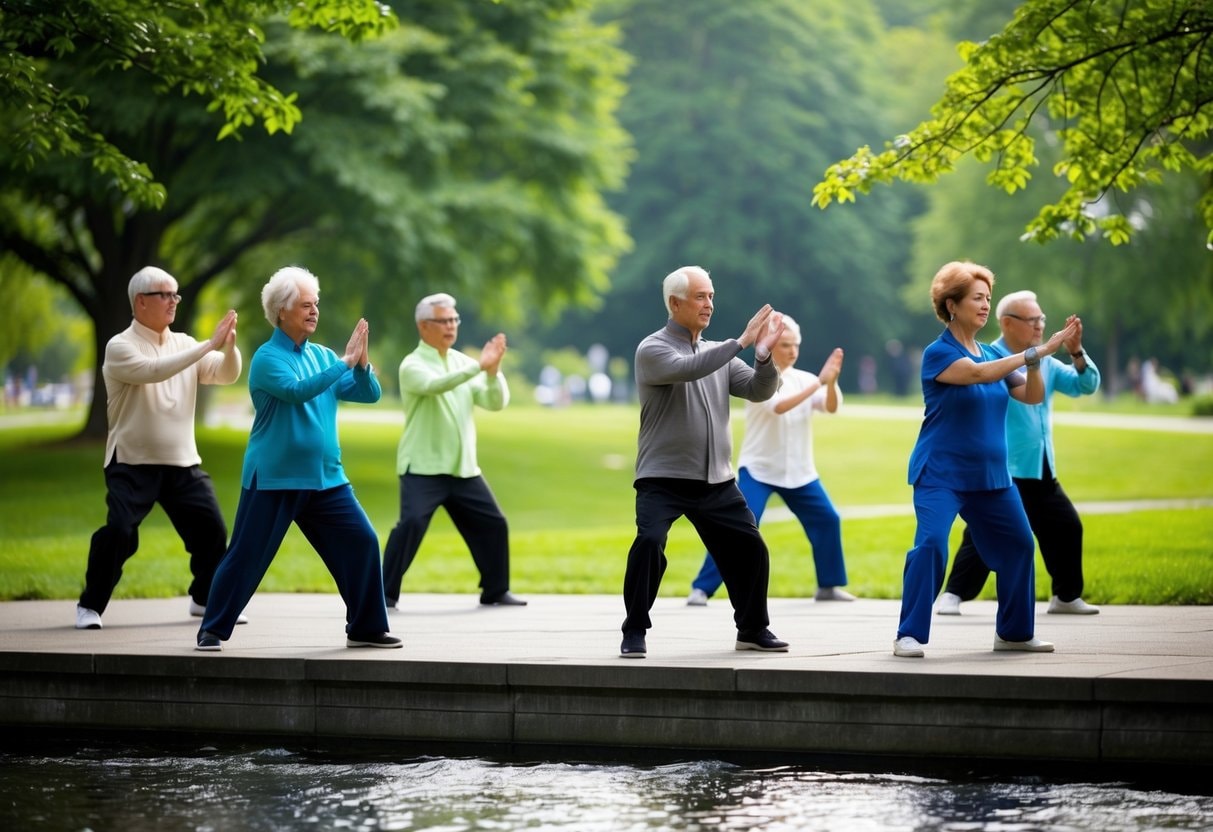
Tai Chi can be modified to suit various health conditions and physical abilities. You can enjoy its benefits regardless of your fitness level or mobility challenges.
Tai Chi for Arthritis and Joint Health
Tai Chi can help manage arthritis and improve joint health. Its gentle, flowing movements put minimal stress on your joints. You can start with simple exercises that focus on your range of motion. For knee osteoarthritis, try slow, controlled leg lifts.
These help strengthen the muscles around your knees without putting too much pressure on them. If you have fibromyalgia, Tai Chi’s mindful movements may help reduce pain and improve sleep quality. Start with short sessions and gradually increase the duration as you feel comfortable.
Seated Tai Chi Variations
Chair Tai Chi is perfect if you have balance issues or limited mobility. You can perform many Tai Chi movements while sitting down. Try arm circles to improve upper body strength and flexibility. Seated leg stretches can help maintain lower body mobility. For those with Parkinson’s disease, seated Tai Chi can help improve coordination and reduce the risk of falls. Focus on slow, deliberate movements to enhance your body awareness.
Tailoring Tai Chi for Mobility Issues
If you have osteoporosis, Tai Chi can help improve your balance and reduce the risk of falls. Start with gentle weight-shifting exercises to build confidence. Tai Chi’s focus on deep breathing can improve lung function for those with COPD. Begin with simple arm movements coordinated with your breath.
If chronic pain is a concern, adapt Tai Chi movements to your comfort level. You can modify the range of motion or speed of movement to avoid discomfort. Remember, even small movements can benefit your health and well-being.
Facts
Don’t worry if you have trouble moving around. Tai Chi can be changed to fit your needs. You can do many Tai Chi moves while sitting in a chair. Focus on arm movements and deep breathing. Even small movements can help you get the benefits of Tai Chi.
Creating a Supportive Tai Chi Community
Joining a tai chi community for seniors can make your practice more enjoyable and rewarding. You’ll find friends, support, and motivation to keep going. Let’s explore how to get started and maximize group Tai Chi for seniors.
Finding the Right Class for You
Look for Tai Chi classes that fit your needs and schedule. Many community centers, gyms, and parks offer senior-friendly sessions. Ask about the instructor’s experience with teaching older adults. Don’t be shy to try a few classes before settling on one. Check if the class pace suits you.
A good instructor will adapt movements for different abilities. Make sure the location is easy to reach and has proper facilities. Before joining, ask about any fees or equipment you might need. Some places offer free trial classes, so take advantage of them to see if they fit.
Benefits of Group Practice
Practicing Tai Chi with others can boost your motivation and enjoyment. You’ll have a set time and place to exercise, making it easier to stick to your routine. Group classes offer a chance to learn from others and share experiences. You might pick up tips from more experienced practitioners or find comfort in seeing others at your level.
Social engagement is a key benefit of group Tai Chi. You’ll meet new people and form friendships. This can help fight loneliness and isolation that sometimes come with aging. Regular group practice can also improve your form and technique. You’ll get feedback from the instructor and fellow students, helping you progress faster.
Engaging with Fellow Practitioners
Don’t be afraid to chat with your classmates before and after sessions. Share your Tai Chi journey and listen to theirs. You might find inspiration or helpful advice. Consider organizing small practice groups outside of class. This can help you reinforce what you’ve learned and build stronger connections. Celebrate each other’s progress, no matter how small. Encouragement from peers can be a powerful motivator in your Tai Chi practice.
If you’re comfortable, exchange contact information with a few classmates. You can remind each other about classes or share interesting Tai Chi resources. Remember, everyone started as a beginner. Be open to both giving and receiving help. Your Tai Chi community can become a source of support and friendship as you age gracefully together.
Mindfulness and Meditation in Motion
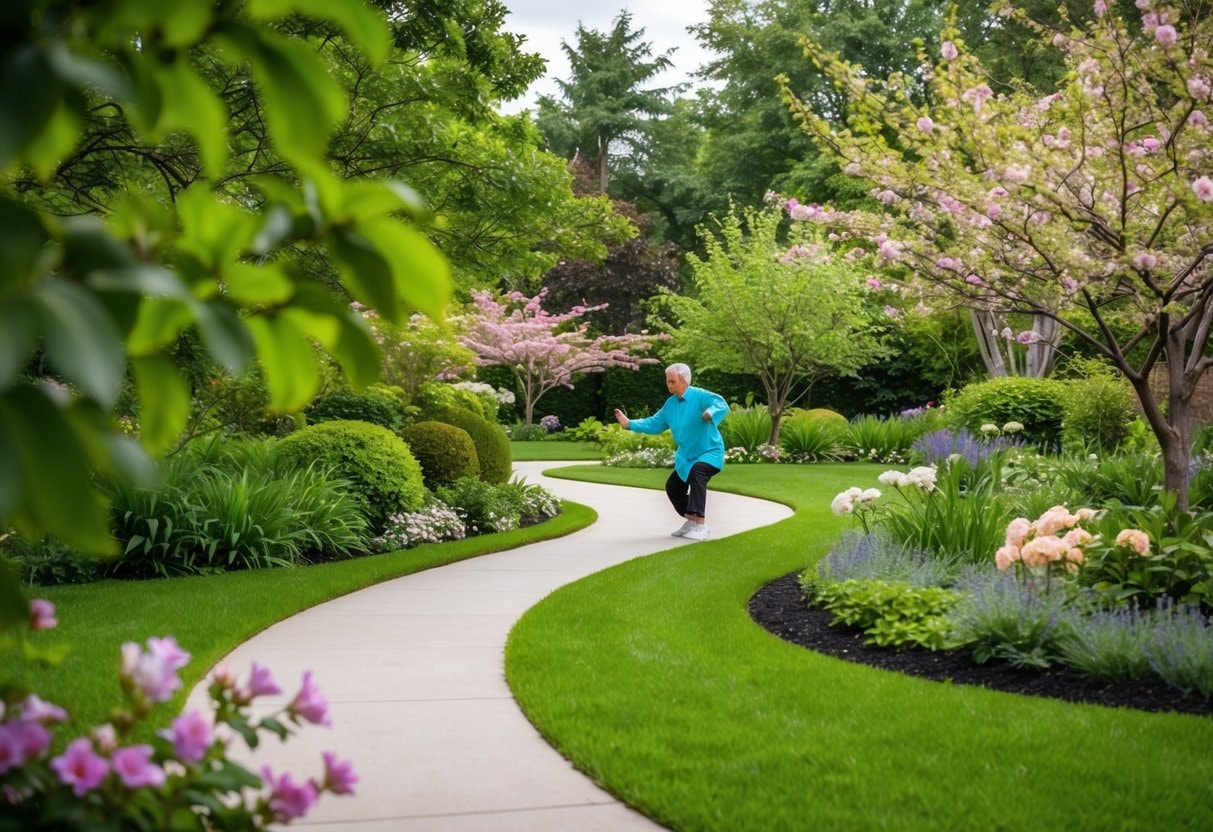
Tai Chi offers a unique blend of physical movement and mental focus. It allows you to cultivate mindfulness while gently exercising your body. This practice can help reduce stress and increase your overall sense of well-being.
Integrating Mindfulness into Practice
As you practice Tai Chi, focus on each movement and breath. Pay attention to how your body feels as you move through the poses. Notice the sensation of your feet on the ground and the air moving in and out of your lungs. Try to let go of distracting thoughts. When your mind wanders, gently bring it back to the present moment.
This mental exercise helps sharpen focus and increases body awareness, making it especially beneficial for Tai Chi for seniors. With regular practice, you’ll find it easier to stay present during sessions and in your daily life. This heightened mindfulness can reduce stress and a greater sense of calm.
The Role of Meditation in Tai Chi
Tai Chi is often called “meditation in motion” because it combines gentle movement with meditative focus. You enter a meditative state as you perform the slow, flowing movements. This moving meditation can be easier for some people than sitting still. It allows you to relax your mind while keeping your body engaged.
The rhythmic movements and deep breathing help quiet your thoughts. Regular Tai Chi practice can also improve your ability to meditate in other settings. You might find sitting quietly or focusing on your breath easier after doing Tai Chi regularly.
Health and Fitness Considerations
Tai Chi offers many benefits for seniors. It can boost your physical fitness and improve your emotional well-being. Let’s look at how this gentle practice can help you stay healthy in body and mind.
Maximizing Physical Fitness Through Tai Chi
Tai Chi is a great, low-impact exercise that helps build strength and flexibility without stressing joints. As you practice Tai Chi, you’ll notice better balance and increased energy. The slow, flowing movements of Tai Chi improve your endurance over time, making it easier to perform daily tasks. Many seniors also report weight loss from regular practice, enhancing their overall well-being.
Proper alignment is key in Tai Chi. This helps you stand taller and move more easily. You’ll learn to be more aware of your body, which can prevent falls. Try to practice Tai Chi a few times a week. Even short sessions can make a big difference in your fitness level.
Tai Chi for Emotional Well-being
Tai Chi isn’t just good for your bodyit’s— great for your mind, too! Its calm, focused nature can help reduce stress and anxiety. Many seniors find that Tai Chi lifts their mood and eases depression. The gentle movements and deep breathing can help you feel more relaxed and at peace.
Tai Chi often involves group classes. This gives you a chance to meet new people and make friends. Social connections are important for your emotional health. As you get better at Tai Chi, you might feel more confident. This can boost your overall sense of well-being.
Techniques for Enhancing Practice at Home
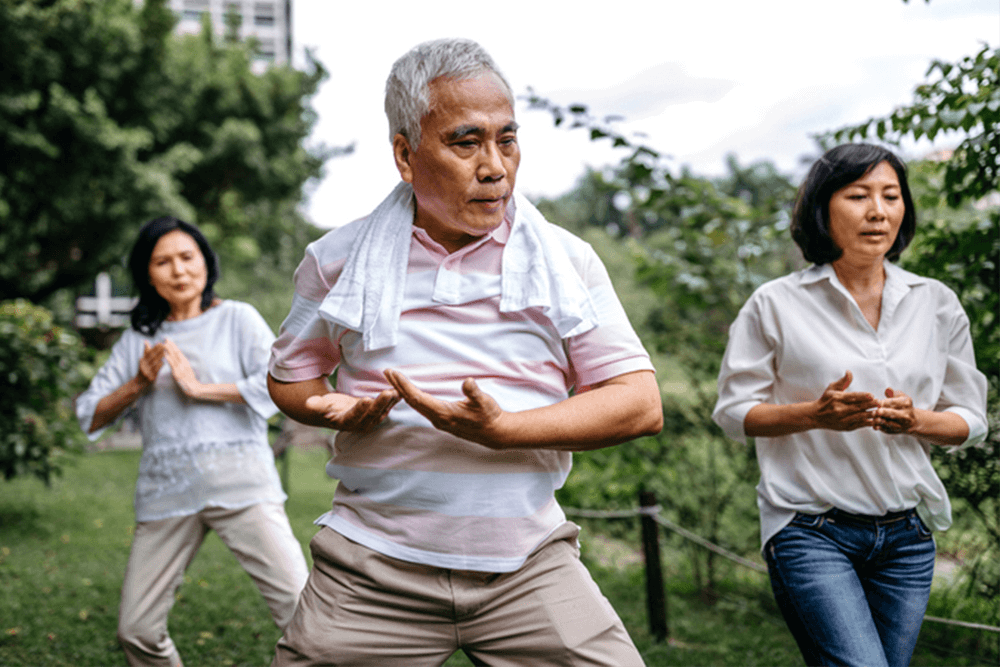
Practicing Tai Chi at home can be easy and rewarding. You can improve your skills with simple steps and tools. Here’s how to make the most of your home practice.
Incorporating Breathing Exercises
Breathing is key to Tai Chi. Try this simple exercise:
- Stand with your feet shoulder-width apart.
- Breathe in slowly through your nose for four counts.
- Hold for two counts.
- Exhale gently through your mouth for six counts.
Do this for 5 minutes daily. It will help you improve flexibility and stability. As you breathe, picture energy flowing through your body. This can boost your circulation and energy levels. Remember, good breathing helps you sleep better, too. Try this before bed to improve your sleep quality.
Establishing a Personal Tai Chi Space
Your Tai Chi space should be calm and clutter-free. Pick a quiet corner in your home. Make sure you have enough room to move your arms freely. Add some plants or a small water feature. These can help create a peaceful mood. Soft lighting can also help you relax and focus. Keep your Tai Chi shoes and comfortable clothes nearby. This makes it easier to practice whenever you feel like it. A mirror can be helpful, too. It lets you check your form as you practice.
Utilizing Online Resources and Videos
Online resources can be great for beginners in Tai Chi. Look for videos made for seniors. These often show moves that are safe and easy to follow. Try these tips when using online resources:
- Start with short 10-15 minute videos.
- Pause and rewind as needed.
- Practice the same video a few times before moving on.
Many websites offer free Tai Chi lessons. You can also find apps that guide you through daily practice. These tools can help you learn quickly and enhance your proprioception. Remember to listen to your body. If something hurts, stop and check your form. Tai Chi should feel good and help you build muscle strength gently.
Here’s an additional video about Tai Chi for seniors.
By: Dr Paul Lam – Tai Chi Productions
Embracing Tai Chi: A Holistic Approach to Health and Well-Being for Seniors
In conclusion, Tai Chi for seniors provides a gentle yet effective approach to maintaining physical fitness and enhancing mental well-being. With its slow, flowing movements and emphasis on mindfulness, Tai Chi is accessible to individuals of all fitness levels and can be easily adapted to accommodate various health conditions. By integrating deep breathing and meditation into the practice, seniors can experience improved balance, flexibility, and strength while enjoying reduced stress and increased emotional resilience.
As a holistic exercise, Tai Chi promotes physical health and fosters social connections and a sense of community, making it an enriching experience. Whether practiced alone or in a group setting, Tai Chi is a powerful tool for graceful aging, helping seniors navigate their golden years with vitality and peace of mind. Embracing this ancient art can lead to a healthier, happier, and more fulfilled life, paving the way for lasting well-being and joy.
Frequently Asked Questions
What Are the Benefits of Practicing Tai Chi for Older Adults?
Tai Chi has many perks for seniors. It can improve balance and muscle strength. This gentle exercise also boosts flexibility and stability in your ankles and legs. Tai Chi isn’t just good for your body; it can help your mind, too. The slow, focused movements can improve your mental focus and memory.
Can Tai Chi Exercises Improve Balance and Prevent Falls in Seniors?
Yes, Tai Chi can help you stay steady on your feet. The slow, controlled movements train your body to be more balanced. Regular practice can strengthen your leg muscles and improve stability. This can lower your risk of falling. Many seniors find they feel more confident moving around after doing Tai Chi.
How Does Tai Chi Contribute to Mental Health and Stress Reduction for the Elderly?
Tai Chi is great for calming your mind. The gentle movements and deep breathing can help you relax and feel less stressed. Practicing Tai Chi may also boost your mood. It can help you feel more positive and less anxious. Some seniors even say it helps them sleep better at night.

